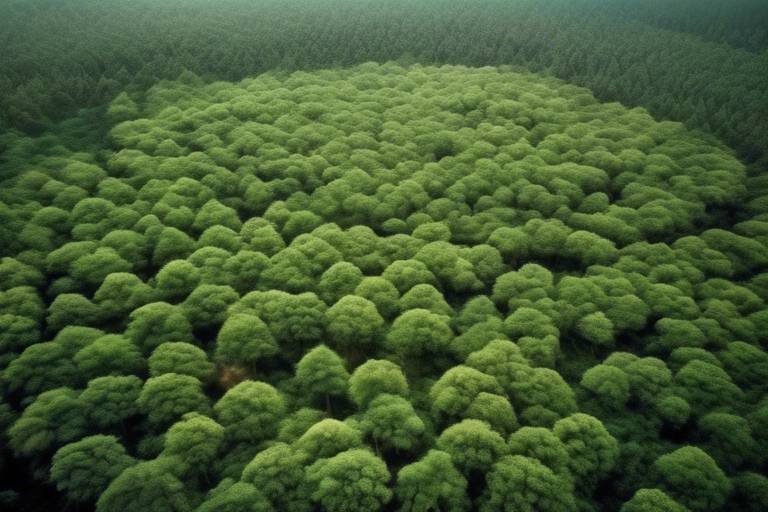The Importance of Ocean Conservation
Ocean conservation plays a crucial role in safeguarding the health and vitality of our planet's marine ecosystems. By preserving the delicate balance of marine life and biodiversity, we are not only protecting the oceans themselves but also ensuring the well-being of countless species that depend on them for survival. Sustainable practices and global conservation efforts are essential in maintaining the resilience and sustainability of our oceans for future generations.

Preservation of Marine Ecosystems
Exploring the critical role of ocean conservation in preserving marine ecosystems, biodiversity, and the overall health of our planet's oceans. Understanding the significance of sustainable practices and global efforts to protect this vital resource.
Marine ecosystems are intricate networks where every species, from the tiniest plankton to the largest whales, plays a crucial role. The delicate balance within these ecosystems is essential for the survival of marine life. Human activities such as pollution, overfishing, and climate change have disrupted this balance, leading to the degradation of marine habitats and the decline of species populations.
Imagine a coral reef as a bustling city where each organism has a specific job to keep the community thriving. When pollution infiltrates these waters or overfishing decimates key species, it's like removing vital cogs from a well-oiled machine. The repercussions are felt throughout the entire ecosystem, affecting not only marine life but also the livelihoods of coastal communities dependent on healthy oceans.
To combat these threats, conservation efforts focus on restoring and preserving marine ecosystems through measures like establishing marine protected areas, implementing sustainable fishing practices, and reducing pollution inputs. By safeguarding these habitats, we can ensure the resilience and vitality of marine ecosystems for generations to come.

Biodiversity in Oceans
When we delve into the vast expanse of the oceans, we encounter a mesmerizing array of life forms that collectively form the intricate tapestry of marine biodiversity. The oceans are teeming with a diverse range of species, from tiny plankton to majestic whales, each playing a vital role in maintaining the balance of marine ecosystems. This biodiversity is not just a spectacle to behold but a crucial component of ecological stability, akin to the diverse instruments in an orchestra coming together to create harmonious melodies.
However, the biodiversity in oceans faces numerous threats, primarily stemming from human activities. Overfishing, habitat destruction, pollution, and climate change are putting immense pressure on marine species, leading to a decline in populations and disrupting the delicate equilibrium of marine ecosystems. The loss of biodiversity not only diminishes the resilience of these ecosystems but also jeopardizes the services they provide, such as food security, climate regulation, and nutrient cycling.
To safeguard the rich biodiversity of our oceans, concerted conservation efforts are imperative. Establishing marine protected areas, implementing sustainable fishing practices, and reducing pollution are crucial steps in preserving marine species and their habitats. By protecting biodiversity in oceans, we not only ensure the survival of countless species but also secure the well-being of future generations reliant on the ocean's resources.

Climate Change and Ocean Health
Exploring the critical role of ocean conservation in preserving marine ecosystems, biodiversity, and the overall health of our planet's oceans. Understanding the significance of sustainable practices and global efforts to protect this vital resource.
Highlighting the interconnectedness of marine life and the delicate balance within ecosystems. Discussing the impact of human activities such as pollution, overfishing, and climate change on the health of these ecosystems.
Examining the rich diversity of marine species and the importance of preserving biodiversity for ecological stability. Addressing the threats to marine biodiversity and the conservation efforts needed to protect vulnerable species.
Exploring the effects of climate change on ocean health, including rising sea temperatures, ocean acidification, and extreme weather events. Discussing the role of ocean conservation in mitigating these impacts and building resilience.
Discussing the importance of sustainable fishing practices in maintaining healthy fish populations and marine ecosystems. Exploring methods such as responsible harvesting, fishing quotas, and marine protected areas to ensure long-term sustainability.
Addressing the growing problem of plastic pollution and marine debris in our oceans. Exploring the impact on marine life, ecosystems, and human health, as well as the need for effective waste management and cleanup efforts.
Highlighting international efforts and agreements aimed at promoting ocean conservation and sustainable use of marine resources. Discussing the role of organizations, governments, and individuals in driving conservation initiatives on a global scale.
Emphasizing the importance of community engagement and education in promoting ocean conservation. Discussing the role of outreach programs, awareness campaigns, and environmental education in fostering stewardship and sustainable practices.
Exploring the evolving challenges and opportunities in ocean conservation, including emerging threats, technological advancements, and innovative solutions. Discussing the need for continued research, collaboration, and action to protect our oceans for future generations.
Climate change poses a significant threat to the health of our oceans. Rising sea temperatures, ocean acidification, and extreme weather events are just some of the consequences of climate change that impact marine ecosystems. These changes can disrupt the delicate balance of marine life, leading to coral bleaching, species migration, and reduced biodiversity.
Through ocean conservation efforts, we can help mitigate the effects of climate change on marine environments. By reducing carbon emissions, promoting sustainable practices, and supporting conservation initiatives, we can build resilience in our oceans and protect them for future generations.

Sustainable Fishing Practices
In the realm of marine conservation, sustainable fishing practices play a crucial role in maintaining the delicate balance of our oceans. By implementing responsible harvesting methods and regulations, we can ensure the long-term health of fish populations and marine ecosystems. One key aspect of sustainable fishing is the establishment of fishing quotas, which help prevent overfishing and allow fish stocks to replenish naturally. These quotas are based on scientific data to ensure that fishing activities are within sustainable limits, preserving the marine environment for future generations.
Another essential strategy in sustainable fishing is the creation of marine protected areas (MPAs). These designated zones restrict fishing activities in sensitive areas, allowing marine life to thrive without human interference. MPAs serve as sanctuaries for marine species, contributing to biodiversity conservation and ecosystem resilience. Additionally, promoting responsible fishing practices among fishermen through education and incentives is vital in fostering a culture of sustainability within the fishing industry.
Collaboration between governments, fisheries, and conservation organizations is key to implementing and enforcing sustainable fishing practices on a global scale. By working together, we can address the challenges of overfishing, bycatch, and habitat destruction, while promoting a more sustainable approach to harvesting marine resources. Sustainable fishing practices not only benefit the environment but also support the livelihoods of fishing communities and ensure a steady supply of seafood for future generations.

Plastic Pollution and Marine Debris
Plastic pollution and marine debris pose a significant threat to the health of our oceans, impacting marine life, ecosystems, and even human health. The pervasive presence of plastic waste in our oceans has reached alarming levels, with devastating consequences for marine species. From entanglement in plastic debris to ingestion of microplastics, marine animals face dire consequences due to our unsustainable plastic consumption habits.
The accumulation of plastic debris not only harms marine life but also disrupts entire ecosystems, leading to long-term consequences for biodiversity and ecological balance. Plastic waste can persist in the marine environment for hundreds of years, breaking down into smaller particles that contaminate the water and threaten the health of marine organisms. The sheer volume of plastic pollution demands urgent action to address this global environmental crisis.
Efforts to combat plastic pollution and marine debris involve a multi-faceted approach, including improved waste management systems, recycling initiatives, and the promotion of sustainable alternatives to single-use plastics. Innovative solutions such as ocean cleanup technologies and community-driven beach cleanups play a crucial role in reducing the impact of plastic waste on our oceans.
Educating the public about the consequences of plastic pollution and fostering a culture of responsible consumption are essential steps towards mitigating this environmental threat. By raising awareness about the importance of reducing, reusing, and recycling plastics, individuals can contribute to the preservation of our oceans and the protection of marine ecosystems.

Global Conservation Initiatives
Global conservation initiatives play a crucial role in safeguarding the health and sustainability of our oceans on a worldwide scale. Various international efforts and agreements have been established to address the pressing issues facing marine ecosystems and resources. These initiatives focus on promoting ocean conservation practices, sustainable use of marine resources, and collaborative strategies to combat threats such as overfishing, pollution, and climate change.
One prominent example of a global conservation initiative is the United Nations Sustainable Development Goal 14: Life Below Water, which aims to conserve and sustainably use the oceans, seas, and marine resources. This goal encourages countries to implement policies that protect marine ecosystems, reduce marine pollution, and regulate fishing activities to ensure long-term sustainability.
Additionally, organizations like the International Union for Conservation of Nature (IUCN) work towards advancing marine conservation through research, advocacy, and policy development. The IUCN Red List of Threatened Species provides valuable data on endangered marine species, guiding conservation efforts to protect vulnerable populations and preserve biodiversity.
Collaborative projects such as the Global Ocean Observing System (GOOS) and the Global Partnership for Oceans bring together scientists, policymakers, and stakeholders to monitor ocean health, share data, and implement conservation measures. These initiatives aim to enhance our understanding of marine ecosystems, address environmental challenges, and promote sustainable practices on a global scale.

Community Engagement and Education
Community engagement and education play a crucial role in promoting ocean conservation and fostering a sense of responsibility towards our marine environments. By actively involving local communities, educational institutions, and various stakeholders, we can raise awareness about the importance of preserving our oceans and marine life.
One effective way to engage the community is through outreach programs that educate individuals about the impact of human activities on the oceans. These programs can include workshops, seminars, and interactive sessions that highlight the interconnectedness of marine ecosystems and the need for sustainable practices.
Furthermore, awareness campaigns can utilize various media platforms to reach a wider audience and inspire action. By leveraging social media, television, and print media, we can amplify the message of ocean conservation and encourage individuals to make environmentally conscious choices in their daily lives.
Environmental education plays a vital role in shaping the attitudes and behaviors of future generations towards ocean conservation. By integrating marine science curriculum in schools and educational institutions, we can instill a sense of stewardship and respect for the oceans from a young age.
Collaboration between government agencies, non-profit organizations, and local communities is essential in driving community engagement initiatives. By working together towards common goals, we can create a collective impact that leads to positive change and sustainable practices for the benefit of our oceans.

Future Challenges and Opportunities
The future of ocean conservation presents both challenges and opportunities as we strive to protect and preserve our marine ecosystems. One of the key challenges we face is the continuing impact of climate change on ocean health. Rising sea temperatures, ocean acidification, and more frequent extreme weather events threaten the delicate balance of marine ecosystems. To address these challenges, innovative solutions and sustainable practices are essential to build resilience and adapt to a changing environment.
Technological advancements offer opportunities for monitoring and managing marine resources more effectively. From satellite imaging to underwater drones, these tools enable scientists and conservationists to gather data, track marine species, and detect environmental changes in real-time. By harnessing technology, we can improve our understanding of ocean dynamics and implement targeted conservation strategies.
Another challenge on the horizon is the increasing pressure on marine resources due to overfishing and habitat destruction. Sustainable fishing practices, such as implementing fishing quotas and establishing marine protected areas, are crucial to ensuring the long-term health of fish populations and marine ecosystems. Balancing the needs of human communities with the conservation of marine biodiversity remains a complex but vital task.
As we look to the future, collaboration and partnerships between governments, organizations, and local communities will be key to driving effective ocean conservation initiatives. By working together on a global scale, we can address transboundary issues, share best practices, and pool resources to protect our oceans. Education and awareness programs play a significant role in engaging the public and fostering a sense of stewardship towards our marine environment.
Opportunities for innovation and sustainable practices abound, offering hope for the future of ocean conservation. From the development of biodegradable alternatives to single-use plastics to the restoration of degraded marine habitats, there is immense potential for positive change. By embracing these opportunities and taking collective action, we can safeguard the health and biodiversity of our oceans for generations to come.
Frequently Asked Questions
- What is ocean conservation?
Ocean conservation refers to the protection and preservation of the marine environment, including marine ecosystems, biodiversity, and resources. It involves efforts to mitigate human impacts such as pollution, overfishing, and climate change to maintain the health and sustainability of the oceans.
- Why is ocean conservation important?
Ocean conservation is crucial for maintaining the balance of marine ecosystems, preserving biodiversity, and safeguarding the overall health of our planet. Healthy oceans are essential for sustaining life on Earth, regulating climate, and providing valuable resources for both marine life and human populations.
- How can individuals contribute to ocean conservation?
Individuals can contribute to ocean conservation by adopting sustainable practices in their daily lives, reducing plastic waste, supporting conservation organizations, participating in beach cleanups, and spreading awareness about the importance of protecting the oceans. Small actions collectively make a significant impact on ocean health.
- What are the main threats to marine biodiversity?
The main threats to marine biodiversity include overfishing, habitat destruction, pollution (especially plastic pollution), climate change, and invasive species. These factors contribute to the decline of marine species and ecosystems, highlighting the urgent need for conservation efforts to protect marine biodiversity.
- How does climate change affect the oceans?
Climate change impacts the oceans in various ways, such as causing rising sea temperatures, ocean acidification, melting ice caps, and more frequent extreme weather events. These changes pose serious risks to marine life, coral reefs, and coastal communities, underscoring the importance of ocean conservation in addressing climate-related challenges.
- What role do global conservation initiatives play in ocean protection?
Global conservation initiatives play a vital role in promoting coordinated efforts to protect the oceans on a worldwide scale. International agreements, conservation projects, and collaborative research efforts help address transboundary issues, establish marine protected areas, and implement sustainable practices to conserve marine resources for future generations.



















